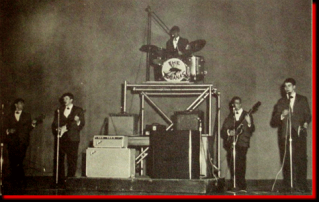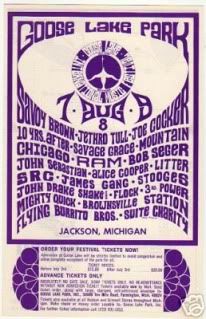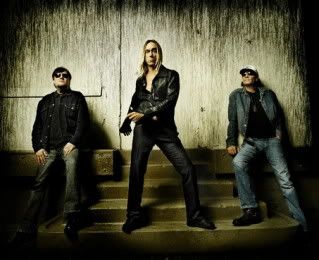
Don Felder,left, former lead guitarist for
the Eagles, brought "An Evening at the Hotel
California" to the Island Resort and Casino.
By STEVE SEYMOUR
Don Felder brought "An Evening at the Hotel California" to the Island Resort and Casino in Harris on Jan. 15, recreating Eagles' hits for a receptive audience.
Playing a variety of guitars, Felder performed flawless versions of a dozen tunes.
He was backed by a crack five-piece band consisting of his son Cory Felder (percussion), Shem von Schroeck (bass), Timothy Drury (keyboards), Chris Ralles (drums) and Frank Simes (guitar).
Born in Gainesville, Fla. the teenage Felder was in bands with Stephen Stills (later of Crosby, Stills & Nash) and Bernie Leadon, who later co-founded the Eagles. Future hit-maker Tom Petty even looked to Felder as his guitar teacher.
Moving to California, Felder contributed a rockier sound to the Eagles when he joined as lead guitarist in 1975.
A career high point came when he composed the music to "Hotel California," the band's signature song.
His first stint in the Eagles lasted until 1980 when he quit the conflict-wrought band.
"An Evening at the Hotel California" proved to be an entertaining show. Felder and his band manipulated their instruments skillfully and included subtle harmonies and background vocals.
The 62-year-old Felder opened the program with "Hotel California," playing the white double-neck Gibson EDS 1275 guitar he used on the hit record. 
As with all the songs he played live, Felder sang lead on his version of the 1977 chart topper. Bandmate Don Henley performed the vocals on the Eagles' original recording, which opened the album of the same name. Released in 1976, the best-selling LP also included "New Kid in Town" and "Life in the Fast Lane."
Next, Felder performed "Already Gone," a track from the Eagles' "On the Border" LP. The single reached the Top 40 in 1974, and featured Felder as a guest guitarist, before he officially joined the Los Angeles-based group.
Felder returned to the Eagles' heyday with "One of These Nights," a No. 1 smash from 1975. He recreated his distinctive lead guitar work from the original, to the audience's approval.
Guitar workout "Pride and Joy" was featured next. The song was written and performed by legendary Texas bluesman Stevie Ray Vaughan. Felder called Vaughan, who was killed in a helicopter crash following a show at Wisconsin's Alpine Valley, "one of my favorite guitar players."
Wearing a black leather jacket, Felder moved to the front of the stage to highlight his guitar-playing during the tribute to Vaughan, who died in 1990.
Felder continued with "Tequila Sunrise," a track from the Eagles' "Desperado" album and a minor hit in the summer of 1973.
"Seven Bridges Road," composed by Steve Young, followed. The Eagles' version of the song, recorded live at the Santa Monica Civic Auditorium on July 28, 1980 went to No. 2 later that year.
The Upper Peninsula audience clapped along as Felder sang the number.
"These Shoes," composed by Felder, Don Henley and Glenn Frey, came next. The song was issued on 1979's "The Long Run," the group's final studio album before their mid-1990s reunion.
Felder turned to his solo career for the next selection, "Heavy Metal (Takin' a Ride)." Featured in the "Heavy Metal" animated film in 1981, the song was released on the Full Moon/Asylum label. The tune has been played on the television program "South Park," Felder said.
"The Long Run," title track from the Eagles' sixth album, came next. The "talk box" guitars on the original recording were played by Felder and Joe Walsh.
Saying "Everybody knows what this song is about, especially Tiger Woods," Felder followed with "Witchy Woman." Felder sang the familiar lyrics: "Raven hair and ruby lips; sparks fly from her fingertips." The song was a Top Ten hit for the Eagles in the fall of 1972.
The No. 1 "Heartache Tonight" followed. Included on "The Long Run," the tune was written by Bob Seger, J. D. Souther, Don Henley and Glenn Frey. Felder's memorable concert version earned the band a standing ovation.
"Take It Easy," written by Jackson Browne and Glenn Frey, served as the encore. Released on June 24, 1972 the single reached No. 12 and was the first of 19 Eagles' songs to chart prior to the group disbanding in 1980.
While "Take It Easy" opened their debut album, it also led directly to the Eagles' mid-1990s reunion. 
After country singer Travis Tritt recorded the song for an Eagles tribute album called "Common Thread," he asked Warner Brothers Records to arrange for the Eagles to appear in an promotional video with him. Tritt never thought the contentious group would ever get together again. However, to Tritt's amazement, the five Eagles joined him in the clip, recorded on Dec. 6, 1993.
The experience led to an Eagles' reunion including Felder, Henley, Frey, Walsh and bassist Timothy B. Schmidt. In 1994, they embarked on the highly successful "Hell Freezes Over" tour. Three more hits, "Get Over It," "Love Will Keep Us Alive" and "Learn to Be Still," followed. All three tracks appeared on the resulting live album, released on Geffen, which debuted at No. 1.
In 1998 they performed again when the Eagles were inducted into the Rock and Roll Hall of Fame. With founders Randy Meisner and Bernie Leadon, all seven past and present members of the Eagles played together for the only time. They performed "Take It Easy" and "Hotel California."
The reunited Eagles also played some shows around New Year's Eve 2000, but Felder was dismissed from the band in 2001 after questioning why his cut of the band's earnings was less than that of Henley and Frey. Previously, the money had been split into five equal shares. Felder sued. The case was settled for an undisclosed amount six years later. 
In 2008, Felder published his autobiography, "Heaven and Hell: My Life in the Eagles (1974-1999)," which made the New York Times Best Sellers list.
After explaining his story in print, Felder is now touring with "An Evening at the Hotel California" showing audiences first- hand the considerable contributions he made to the Eagles.












